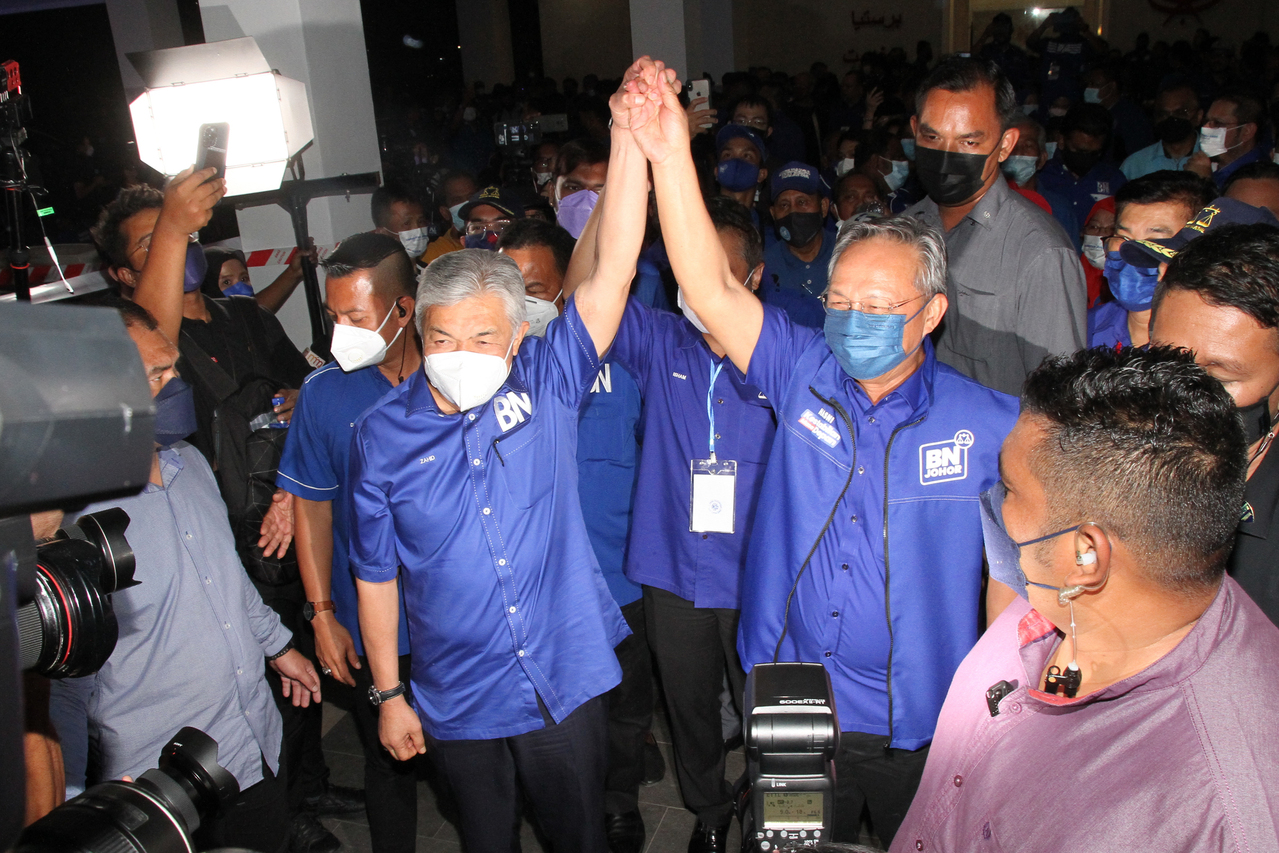Pressure to mount for early Malaysian general election
Sign up now: Get insights on the biggest stories in Malaysia

The Umno-led Barisan Nasional is expected to increase pressure for an early general election after the coalition's win in Johor.
PHOTO: THE STAR/ASIA NEWS NETWORK
PETALING JAYA (THE STAR/ASIA NEWS NETWORK) - Following Barisan Nasional's (BN) landslide win in the Johor state election, political analysts expect influential ranks within Umno - which leads the Barisan coalition - to demand that a general election be called soon.
They said the Umno general assembly, which begins on Wednesday (March 16), would be a perfect platform for their rallying battle cry.
Professor Sivamurugan Pandian of Universiti Sains Malaysia expects the pressure to increase on Prime Minister Ismail Sabri Yaakob to dissolve Parliament for an early general election.
"He may have an uphill task in staving off calls for a general election, especially if they come from the Umno grassroots at the party's general assembly.
"There will be prior indication if this will happen, as the Umno supreme council will meet first to set the agenda for the general assembly," he said on Sunday.
Prof Sivamurugan said that although Datuk Seri Ismail Sabri held the post of prime minister, as Umno vice-president, he sat below party president Ahmad Zahid Hamidi and deputy president Mohamad Hasan.
"It would be different if Ismail Sabri was Umno president as he would then be able to have the final word on the matter," he said.
Zahid and Datuk Seri Mohamad had previously called for an early general election but subsequently agreed not to push for it because of the Covid-19 pandemic.
Prof Sivamurugan said Parti Pribumi Bersatu Malaysia's dismal showing in the Melaka and Johor elections was also a factor in the push for an early general election.
On the memorandum of understanding inked last September with Pakatan Harapan (PH) for, among other things, Parliament not to be dissolved until July 31, 2022, he said calls for a snap election would not be entirely against the agreement.
"Parliament could be dissolved in May or slightly later as they will still have 60 days to call for a general election.
"This would put the timeframe for the general election to be after Hari Raya Aidifitri, with a window of opportunity coming during the school holidays. It is all about timing in politics," he said.
BN won a super majority of 40 seats out of 56 contested in Johor, with PH winning 13 and Perikatan Nasional taking just three seats.
The Melaka state election on Nov 20 saw BN winning handsomely, taking 21 of the 28 seats.
Professor James Chin of the University of Tasmania said BN, particularly Umno, would want to maintain the momentum of the election victories.
"The Barisan coalition cannot afford to wait long if they want to win. Umno wants to use the momentum of the wins in the state elections to push for the general election. In fact, I think they want it earlier than June," he added.
Prof Chin, who accurately predicted the outcome of the Johor state polls, said Perikatan would face problems going into the next general election.
"It is quite obvious that the Malays are not too keen on Parti Pribumi Bersatu Malaysia, which is seen as an Umno clone. So the Malays would rather vote for the original party," he added.
Prof Chin also said PH would likely lose the general election if opposition leader Anwar Ibrahim continues to lead it.
"But there is still time for the opposition to do something about it," he said.
Professor Nik Ahmad Kamal Nik Mahmod of the International Islamic University Malaysia said the coming Umno general assembly was likely to provide the indication on whether the general election would be held this year.
"I believe this will be raised by the Umno grassroots during the general assembly. Umno is confident of seizing power if polls are held this year," he said.
He, however, cautioned that the election results in Melaka and Johor could be a "false positive" for Umno and BN.
"This is because of the lower turnout in both elections compared to the much higher turnout one sees during a general election," he said.
Besides the mounting pressure to call an early general election, he said Mr Ismail Sabri could also face pressure with regard to the Cabinet line-up under the federal Perikatan administration and those holding posts in government-linked companies.
Universiti Technologi Malaysia political analyst Mazlan Ali feels that BN would not have enjoyed a landslide win in Johor if PH and Perikatan had worked together.
"In Parit Yaani alone, the Barisan candidate won with a slim 294-vote majority when he got 9,070 votes. But if you combine the Perikatan and Pakatan votes, they would have garnered 14,211 votes and won the seat with almost a 5,000-vote majority," he said when contacted.
He said if the opposition parties did not find middle ground and unite, a similar scenario could repeat in the general election with BN winning a two-thirds majority.
With GE14 held in May 2018, the next general election will have to be called on or before July 2023.


